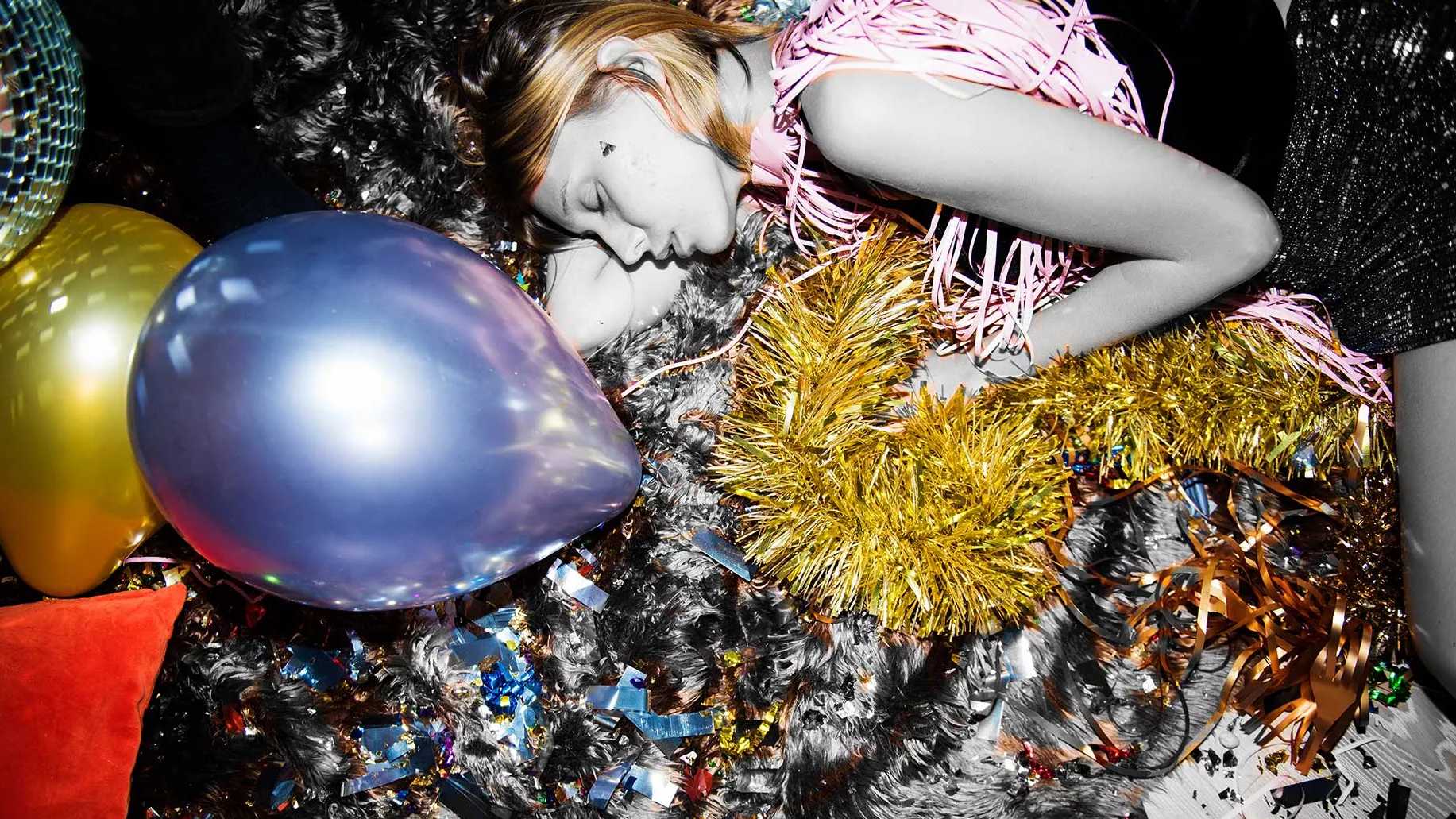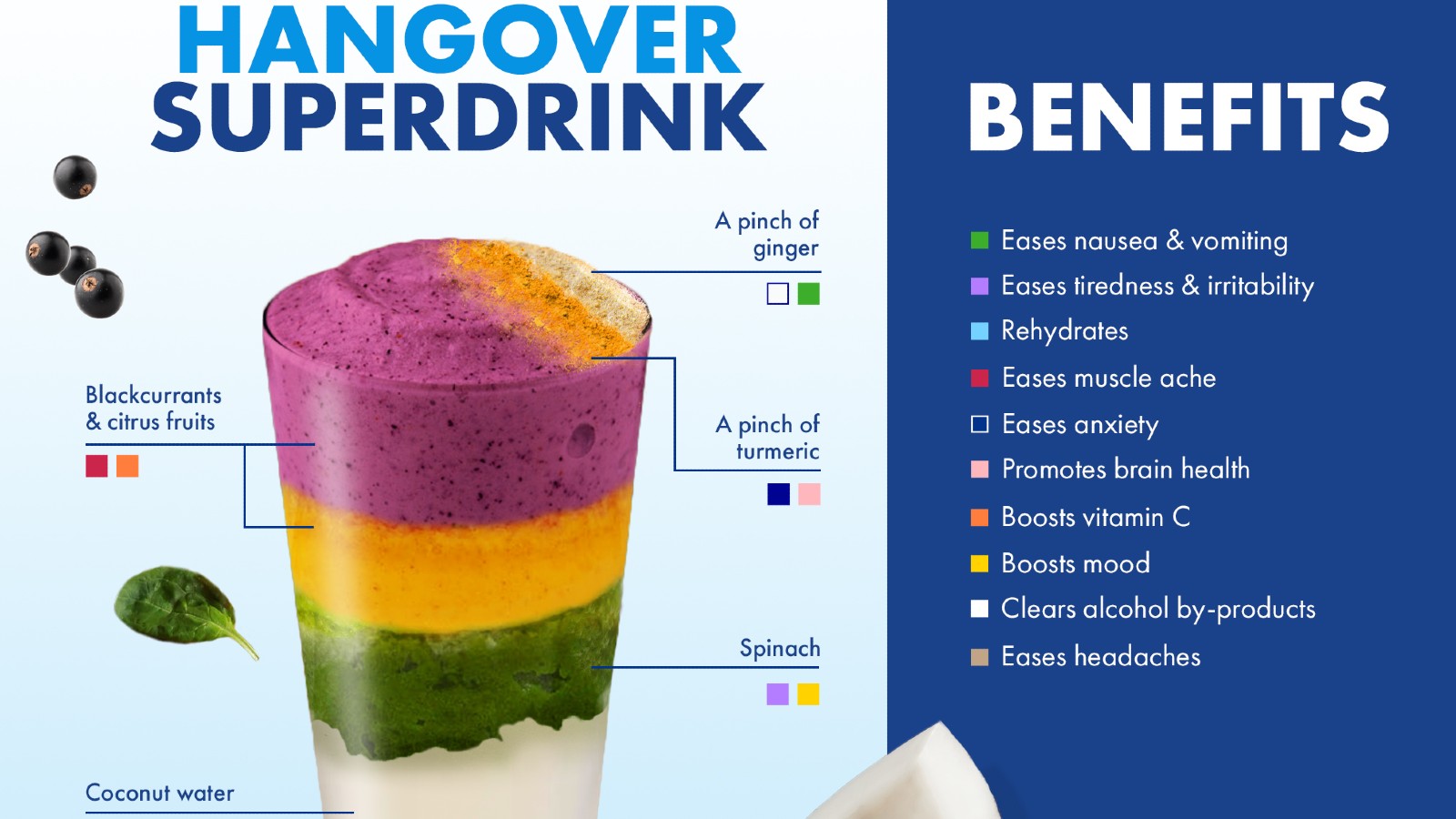Hangover myths debunked—you might want to read this before reaching for that glass of wine
Hangover myths—the good, the bad and the ugly of hangover cures


How to separate the hangover myths from the hangover cures - which ones actually work?
Obviously moderation is the best way to avoid the pain of a wine hangover, especially when you realise how much sugar is in your alcoholic drinks.
But if it's too late, and you're already nursing a fuzzy head, you might be looking for a remedy for what ails you. Despite what you might think, ‘curing’ your festive hangover with fried food won’t work. And no, 'hair of the dog' the morning after the night before, is never wise. Here’s why...
According to Sue Jones, Director of Wellbeing & Nutrition at We Are Wellbeing: “Dehydration is a key cause of hangovers and some of the most common hangover symptoms include headaches, nausea and tiredness. There is evidence to suggest that some people are more sensitive to dark coloured drinks such as whiskey, brandy, darker beer and red wine due to them containing larger amounts of congeners.”
And while wellness gifts may give us all a welcome boost, coconut water brand and hangover hero Vita Coco has teamed up with nutritionist Dr Deborah Lee at Dr Fox Online Pharmacy, to answer some of the most-Googled hangover questions, that we could all learn from...

Will throwing up help a hangover?
Being sick won’t help when you’re suffering with a hangover. Dr Lee reveals why: “When you drink alcohol, it’s very quickly absorbed from the stomach into your bloodstream, so vomiting now will make very little difference to your blood alcohol level.
“To get over a hangover you need to be rehydrated. Vomiting makes you more dehydrated, so this is totally counterproductive.”
Will eating help a hangover?
Yes. Eating a good breakfast can help a hangover. According to Dr Lee: “When you wake up with a hangover, your blood sugar levels will be low which can make you feel lethargic, weak, and may give you a headache. Alcohol also reduces the ability of your kidneys to absorb water, meaning you pass more urine, and become dehydrated. It can also cause an electrolyte imbalance, meaning your sodium and potassium levels are disturbed.
Dr Lee advised, “Eat some carbohydrates for energy, try to replace vitamins and minerals, eat some protein and avoid fatty, oily food and salty food if you can. Coconut water has been shown in medical studies to be an excellent choice when you need rehydration as it contains high levels of electrolytes, is less acidic and has a relatively low sugar content.”
Why do I get a two-day hangover?
Typically, hangover symptoms last around 24 hours, so why do some of us suffer for even longer?!
“During the time after drinking, alcohol is being broken down to acetaldehyde, and this is thought to be a major reason for the misery of hangover symptoms. However, some people metabolise acetaldehyde more slowly, and the toxic effects can remain even after blood alcohol levels have reached zero. This means your hangover lasts longer,” Dr Lee warns.
“Don’t forget the role of congeners. These are biologically active compounds, added to alcoholic drinks to affect the taste, smell, or appearance and maybe metabolised more slowly.”
A post shared by Vita Coco (@vitacoco)
A photo posted by on
Will exercise help a hangover?
It’s a common myth that a sweaty session in the gym will help you to rid the alcohol from your body. Sadly, this is not the case as Dr Lee explains:
“The only way to get rid of that excess alcohol is to let your liver work its magic. Sweating in the gym will cause further dehydration and is likely to make you feel worse. Your cognitive function is notably reduced when you are hungover and this affects your risk-taking behaviour and decision making abilities, meaning you’re more likely to overdo it in the gym and risk injury.”
Unfortunately, there’s no quick fix to get you feeling back to your usual, perky self when you’re hungover, but there are certain ingredients that can really help you on your way to recovery and ease some of those nasty symptoms.
Will a shower help a hangover?
Unfortunately, even at the best time a shower will not cure a hangover. Your miserable hangover symptoms are due to large amounts of alcohol being broken down in the liver. This results in large quantities of acetaldehyde - the major metabolic breakdown product of alcohol – in your bloodstream. Acetaldehyde is thought to be the major cause of your symptoms and, sadly, you can't scrub that away in the shower!
A shower will probably help you feel brighter and more refreshed, but it will not remove your hangover symptoms. These take time to resolve so you need to practice patience.
Will coffee help a hangover?
Although you may reach for a hot cup of coffee, funnily enough, caffeine for a hangover is not the answer.
Both caffeine and alcohol are metabolised in the liver but drinking caffeine will not speed up the alcohol breakdown. Caffeine works by blocking adenosine receptors in the brain. Adenosine is a neurotransmitter in the brain which calms you down and makes you feel less anxious. Caffeine has the opposite effect - waking you up and making you feel more alert. Alcohol increases the effects of caffeine. If you feel less drowsy, you may even feel more inclined to drink even more alcohol!
Caffeine is a diuretic, so it doesn't help with rehydration. Excess caffeine can make you feel jittery, excitable, give you palpitations and even trigger headaches and migraines.
Instead try this hangover super drink recipe...

Why do hangovers get worse with age?
It's not entirely clear if hangovers get worse with age. One 2014 Danish study, involving 51,645 participants aged 18-94, reported that hangovers were significantly more common in younger, than older, age groups. The risk of a severe hangover was almost seven times higher in the 18-29-year-old age group than in those aged over 60.
An ageing liver is likely to clear alcohol more slowly than a younger liver. However, the intensity of the hangover is also related to other factors such as BMI, when food was last eaten, other medication, and psychological factors, for example, the degree of guilt the next morning...
How to prevent a hangover?
Of course, the best way to stay hangover-free is to keep your tipples to a minimum. But if a night of drinking is on the cards, here are a few tips for reducing the impact:
- Eat before you go out - this helps you absorb alcohol more slowly and means you feel fuller more quickly, so can help you drink less.
- Drink lots of water - drink a glass of water with, or in between, each alcoholic drink. Drink a pint of water or a carton of coconut water before you go to bed at the end of the evening.
- Choose your drinks wisely. Take note of the alcohol content on the bottles and choose a lower alcohol option. There are higher quantities of congeners in dark or coloured drinks such as red wine, and whisky as opposed to white wine, vodka and gin.
- Try dosing with ginger - this has been shown to relieve hangover symptoms. Ginger is a potent antioxidant, and for example, has been shown to improve fatty liver disease in mice. It can help relieve symptoms such as nausea, vomiting, and diarrhoea.
Selina is a Senior Entertainment Writer with more than 14 years of experience in newspapers and magazines. She currently looks after all things Entertainment for GoodtoKnow, Woman&Home and My Imperfect Life.
Before joining Future Publishing, Selina graduated from the University of Sheffield in 2006 with a degree in Journalism. She is fully NCTJ and NCE qualified and has 100wpm shorthand. Having spent the start of her career working on local newspapers and online, Selina spent six years as Acting News Editor and Entertainment Reporter at the Scunthorpe Telegraph where she dug into hard news stories, conducted interviews, covered court reporting, features, and entertainment, whilst going to gigs in her spare time.
Whilst at the paper she was awarded an O2 Media Judges' Special Award for helping a terminally ill cancer sufferer realise his dying wish and marry his childhood sweetheart through a successful newspaper campaign. Things like this are close to her heart when it comes to using journalism to make a positive difference in people's lives.
Selina later branched further into all things celebrity to became a Showbiz Writer at Heat magazine, covering red carpet events, showbiz parties, and various launches before going freelance for two years. One of her biggest celebrity achievements - aside from generating celebrity exclusives - was interviewing Take That (including Robbie Williams) and bumping into Simon Cowell so much at events she told him 'I'm calling you my showbiz dad!'
In 2017 she joined TI Media as a senior reporter on Woman, Woman's Own, Woman&Home, Woman's Weekly celebrity desk before branching online in 2020 when Future gave her the opportunity to focus on digital-first.
When she's not interviewing celebrities you can find her exploring new countryside walking routes, catching up with friends over good food, or making memories.